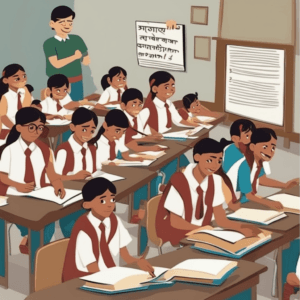In this section, we present current challenges that the Indian Education system faces in both school and Higher education. Do visit this page for updated information from time to time.
Current Issues in Indian Education System
School Education in India
It is believed that school education in India is the most critical issue we need to address to build a brighter future for our Country. On the one hand, we have made significant progress in recent years; on the other hand, we have a long way to go to ensure that every child has access to quality education.
One of the critical challenges that we still face in India is the lack of infrastructure in many schools. Many schools lack basic facilities such as clean water, toilets, and electricity, which can have a major impact on the quality of education that students receive which is more true in the rural areas, where many schools are poorly funded and struggle to attract qualified teachers.
Another challenge that we face is the high dropout rate among students. Many children are forced to drop out of school due to financial constraints or because they are needed to work to support their families. This is more true for girls, who are often discouraged from pursuing education due to cultural and societal norms.
To meet the challenges, we need to focus on improving the quality of education in our schools. This means investing in better infrastructure, providing teacher training programs to ensure teachers have the skills and knowledge to provide quality education, and creating initiatives encouraging students to stay in school and pursue higher education.
It is also important to remember that education is not just about academic learning but also about character development and preparing students to be responsible citizens of society. We must focus on developing programs that help students develop values such as empathy, integrity, and respect for diversity.
Finally, we need to recognize that education is a collective responsibility. It is not just the responsibility of the government but also parents, teachers, and the community. A brighter future can be created for our children, if we work together and ensure that they have the necessary tools and knowledge to succeed in life.
Let us make joint efforts and build a better future for our children and the Country.
Higher Education in India
“Higher education plays a critical role in shaping the future of a nation. In India, higher education has undergone a significant transformation in recent years. With more than 60,000 institutions offering higher education, India is perhaps one of the largest education systems in the world.
However, despite the growing number of institutions, there are still several challenges that the higher education system faces. These challenges include outdated curricula, lack of funding, and a shortage of qualified faculty. These issues harm the quality of education being imparted and limit the opportunities available to students.
To address these challenges, the Indian government has launched several initiatives, such as the Rashtriya Uchchatar Shiksha Abhiyan (RUSA) and the National Institutional Ranking Framework (NIRF). These initiatives aim to improve the quality of higher education in India by funding institutions, promoting research and innovation, and encouraging collaboration among institutions.
Despite these efforts, there is still a long way to go before India’s higher education system can match the standards of the world’s leading education systems. We must collectively develop a system that provides quality education, encourages innovation, and empowers our students to take on the world.
Moreover, with the increasing popularity of online learning, the Indian education system has also embraced e-learning platforms and Massive Open Online Courses (MOOCs) to make higher education more accessible and affordable.
As the world becomes more competitive, it is crucial to invest in higher education to stay ahead. The Indian government, educational institutions, and stakeholders must continue to work together to provide quality higher education to the youth of the Country and enable them to compete on a global scale.”




